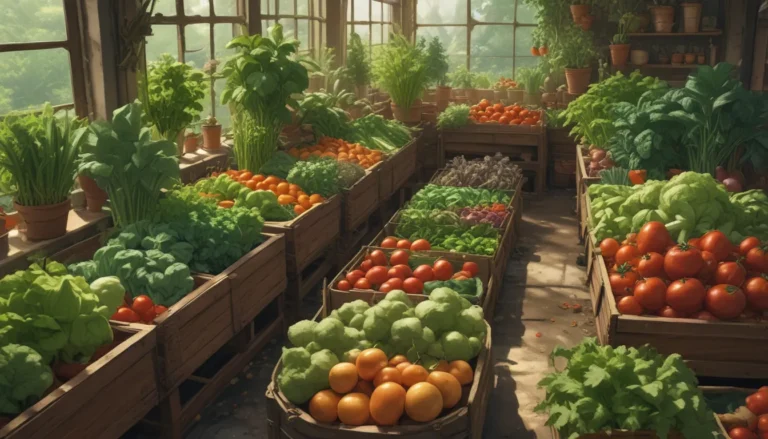Unveiling the Power of Vitamin A-Rich Homegrown Vegetables

Are you ready to dive deep into the world of vitamin A and discover the top homegrown vegetables that can provide you with this essential nutrient? Join me as we explore the benefits of vitamin A, how it supports our bodies, and the vegetable sources that can help us meet our daily requirements.
Uncovering the Power of Vitamin A
Let’s start with the basics – what exactly is vitamin A and why is it important for our health?
Vitamin A is a fat-soluble vitamin that plays a crucial role in various bodily functions. There are two main types of vitamin A: preformed vitamin A found in animal products, and provitamin A carotenoids found in plants.
- Preformed Vitamin A: This includes compounds like retinol, retinal, and retinoic acid that are readily usable by the body.
- Provitamin A Carotenoids: These compounds, such as beta-carotene, need to be converted into retinol by the body before they can be utilized.
Beta-carotene is a well-known provitamin A carotenoid that gives fruits and vegetables their orange color. Other carotenoids like lycopene, lutein, and zeaxanthin also offer unique health benefits even though they don’t convert into vitamin A.
The recommended daily allowance for vitamin A is 900 micrograms of RAE for males aged 14 and up, and 700 micrograms for females in the same age range. It’s important to note that different foods contain varying amounts of usable vitamin A, so it’s essential to consume a diverse range of sources.
Unleashing the Benefits of Vitamin A
Now that we understand what vitamin A is, let’s explore how it benefits our bodies:
- Gene Expression: Vitamin A plays a key role in gene expression, controlling the production of essential proteins in our bodies.
- Immune Function: It supports a healthy immune system, helping us fight off infections and illnesses.
- Cell Growth: Vitamin A is crucial for cell growth and development.
- Vision: Vitamin A is essential for good eyesight, as it is a structural component of the retina.
Having adequate vitamin A in our diets can help reduce the risk of age-related vision problems like macular degeneration. So, it’s clear that this nutrient is vital for overall health and well-being.
Embracing Vegetable Sources of Vitamin A
Now, let’s explore some of the top homegrown vegetable sources of vitamin A:
1. Broccoli
- Vitamin A Content: One cup of chopped cooked broccoli provides 120 micrograms of RAE.
- Variety: Consider growing ‘Waltham 29’ broccoli, known for its large, blue-green heads and cold tolerance.
2. Carrot
- Vitamin A Content: A medium carrot contains 509 micrograms of RAE, meeting over 60% of the daily value.
- Variety: Try ‘Tendersweet’ heirloom carrots with their deep orange color and sweet flavor.
3. Pumpkin
- Vitamin A Content: Half a cup of canned pumpkin puree offers 950 micrograms of RAE, meeting over 100% of daily needs.
- Variety: ‘Small Sugar’ pumpkin is an heirloom favorite known for its sweet, tender flesh.
4. Spinach
- Vitamin A Content: One cup of raw spinach leaves contains 141 micrograms of RAE.
- Variety: Consider ‘Bloomsdale Long Standing’ spinach for its abundant harvest of tender leaves.
5. Sweet Potato
- Vitamin A Content: A medium sweet potato provides 1180 micrograms of RAE, surpassing the daily recommended amount.
- Variety: ‘Beauregard’ sweet potatoes are known for their rich orange flesh and sweet flavor.
Harvesting a Clearer Vision
By incorporating these vitamin A-rich vegetables into your garden and diet, you can promote better health and enjoy the delicious flavors of homegrown produce. Have you cultivated any of these super sources in your garden? Share your experience in the comments below!
For more insights into vitamins and minerals in homegrown produce, check out these informative articles:
- Get Your Daily Dose of B Vitamins with These Homegrown Vegetables
- Top 10 Reasons to Love Tomatoes and Add More to Your Diet
- Health Benefits of Mustard Greens
Let’s celebrate the power of homegrown vegetables in nourishing our bodies and enhancing our well-being.
Remember, always consult with a healthcare professional before making significant changes to your diet or lifestyle. Your health is precious, so it’s essential to approach nutritional decisions with care and caution.
Embrace the vibrant world of vitamin A-rich vegetables, and savor the goodness that nature provides. Happy gardening and happy eating!





